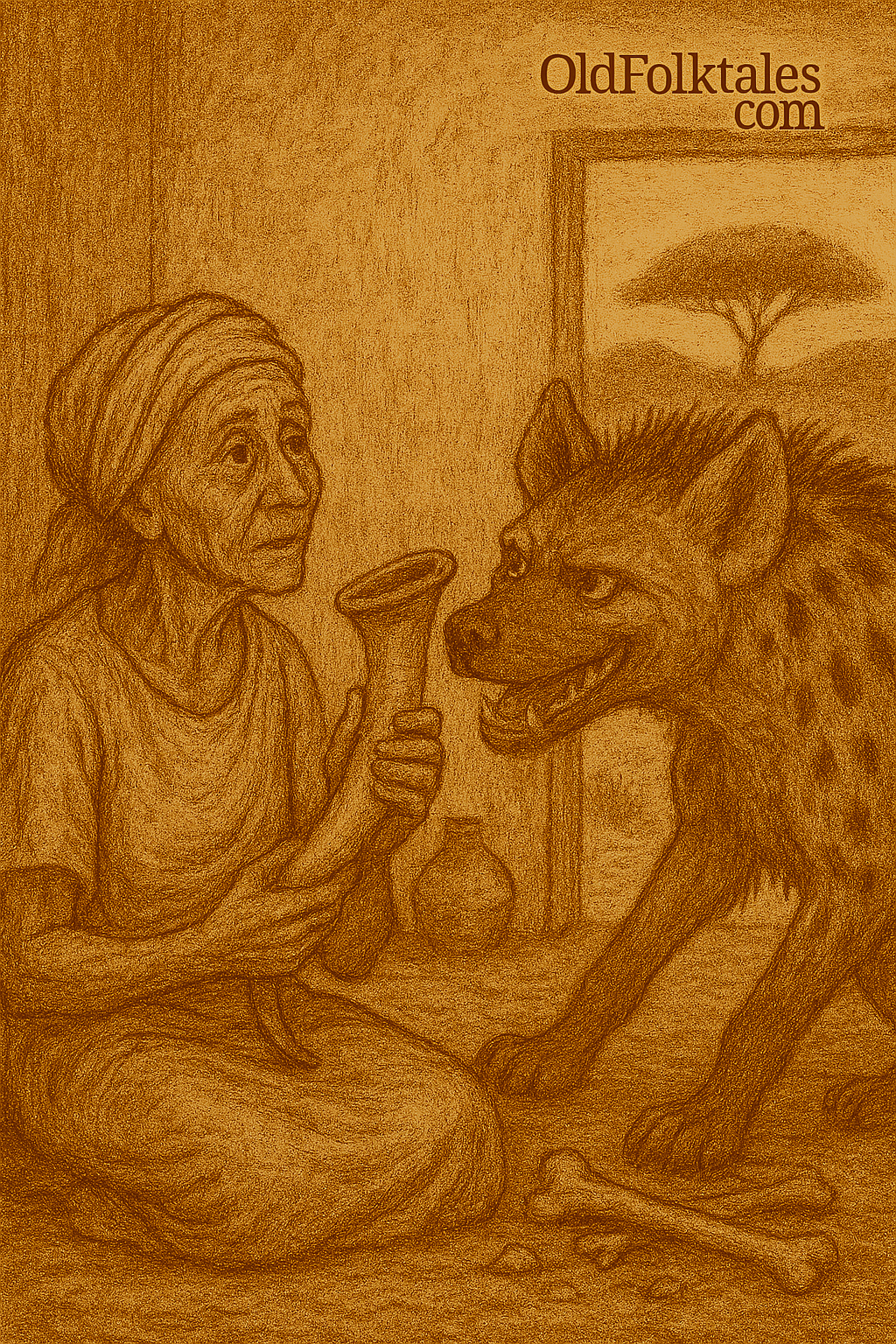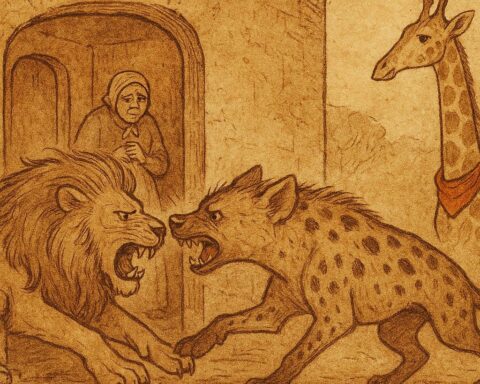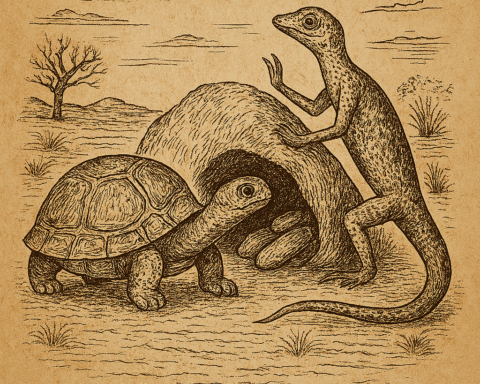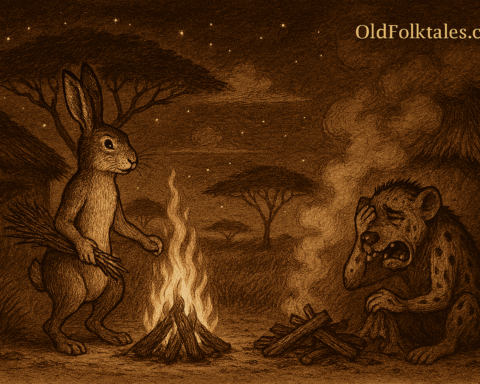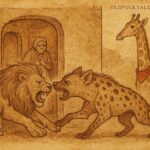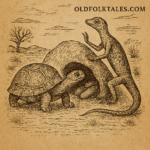In the ancient lands of Senegal, where the Wolof people have weathered countless seasons of both abundance and hardship, there came a time when the earth itself seemed to turn against all living creatures. The great famine had descended like a merciless spirit, withering the millet in the fields and drying up the streams that had once sustained entire communities.
Animals grew thin and desperate, children cried with empty bellies, and even the strongest warriors found their vigor fading as the months of scarcity stretched endlessly before them.
Yet in this landscape of universal suffering, there lived one remarkable old woman who possessed something that set her apart from all others, a secret that allowed her to survive while those around her struggled against starvation. Hidden within her modest dwelling was a magical horn of extraordinary power, an ancient artifact that could provide her with anything her heart desired. When she spoke her needs to this mystical object, food would appear as if conjured from the very air, water would flow from nothingness, and all manner of necessities would manifest before her eyes.
The old woman treasured this horn above all earthly possessions, for she understood its immense value not only to herself but to anyone who might claim it. She had lived long enough to witness the greed and desperation that desperate times could awaken in even the gentlest souls, and she knew that such a powerful object would make her the target of countless pleas, demands, and possibly even violent attempts at theft.
As word of her continued well-being during the famine began to spread through whispered conversations in the marketplace and hushed discussions around dying fires, curious neighbors started to wonder how this elderly woman managed to maintain her strength while others grew weak. Some suspected she had hidden stores of grain, others thought she might possess secret knowledge of edible plants, but none guessed the true source of her survival.
It was during these darkest days of the famine that the hyena came calling at her door. This creature, known throughout Wolof tradition for his cunning intelligence and silver tongue, had heard rumors of the old woman’s mysterious prosperity and had come to investigate for himself. When he discovered the truth about the magical horn, his eyes gleamed with the desperate hunger of one who had found the answer to all his problems.
“Beloved mother,” the hyena began, his voice dripping with false respect and manufactured affection, “you who are so wise and generous, I come to you in my hour of greatest need. The famine has taken everything from me, my strength, my hope, my very will to continue living. I beg you, lend me your magical horn so that I too might survive these terrible times.”
The old woman looked upon the hyena with the steady gaze of one who had seen much of life and learned to read the true intentions behind honeyed words. Her weathered hands clutched the horn protectively as she shook her head with firm resolve.
“No,” she said, her voice carrying the weight of hard-earned wisdom. “I cannot and will not lend you this horn. I know your nature, clever one. If I place this precious object in your paws, you will disappear into the wilderness and never return it to me. Then we will both be lost to the famine’s cruel embrace.”
But the hyena had not earned his reputation for cunning without reason. He began to weave a tapestry of flattery so skillfully crafted that even the wise old woman found her resistance beginning to weaken. He praised her beauty, her intelligence, her generous spirit. He spoke of her reputation throughout the land as a woman of great virtue and compassion. He painted vivid pictures of the suffering he had witnessed and the lives she could save through her kindness.
“Surely,” he said, his voice trembling with manufactured emotion, “a woman of your noble character would not allow others to perish when she holds the power to save them. Your heart is too pure, your soul too generous to hoard such blessings while your neighbors waste away. I swear by all that is sacred that I will return your horn the moment my immediate needs are met.”
Hour after hour, the hyena continued his relentless campaign of flattery and emotional manipulation. He spoke of starving children, of elderly parents watching their offspring fade away, of entire communities on the brink of extinction. Slowly, inexorably, the old woman’s defenses crumbled beneath the weight of his persuasive words and her own compassionate nature.
Against every instinct that screamed warnings in her mind, against all the wisdom she had accumulated through decades of life experience, the old woman finally yielded to the hyena’s pleas. With trembling hands and a heart heavy with foreboding, she placed the magical horn in his eager paws.
The moment the horn touched his grasp, the hyena’s demeanor changed completely. The false gratitude vanished from his features, replaced by triumphant satisfaction. Without another word, without even a backward glance at the woman whose kindness he had exploited, he disappeared into the wilderness, leaving behind only the echo of his departing footsteps and the old woman’s growing realization of what she had done.
Years passed like slow-moving seasons of suffering. The old woman, now left without her magical source of sustenance, found herself facing the same desperate hunger that plagued her neighbors. As her strength waned and her hope dwindled, she made the difficult decision to venture forth from her village in search of the thieving hyena and her stolen horn.
Her journey was long and treacherous, taking her across sun-baked plains, through dense forests, and over rocky hills that tested every remaining ounce of her endurance. She followed rumors and whispered stories, tracked footprints that had long since been erased by wind and rain, and persisted even when logic told her the search was hopeless.
At last, her wandering led her to the base of a towering mountain where she made a discovery that filled her with both relief and sorrow. There, beneath the shadow of the great peak, lay the hyena’s lifeless body. Whether he had perished from accident, illness, or the mountain’s harsh conditions, she would never know but clutched in his stiffened paws was her precious magical horn.
With tears streaming down her weathered cheeks, tears of joy for the horn’s recovery and tears of sadness for the waste of life that greed and deception had caused, the old woman reclaimed her treasure. As she held it once again, feeling its familiar weight and power, she made a solemn vow that would guide the rest of her days.
Never again would she allow her compassionate nature to override her practical wisdom. Never again would she be swayed by flattery or moved by pleas, no matter how desperate or heart-rending they might seem. The magical horn would remain hers alone, a lesson learned through bitter experience about the dangers of misplaced trust.
Moral Lesson
This profound Wolof folktale teaches us that while generosity and compassion are noble virtues, they must be tempered with wisdom and discernment. The story warns against allowing others to exploit our kindness through flattery and emotional manipulation. It reminds us that some individuals will take advantage of our generous nature for their own selfish purposes, and that protecting our resources and well-being is not selfishness but necessary wisdom. Sometimes, saying “no” to others’ demands is the most responsible choice we can make.
Knowledge Check
Q1: Who are the main characters in this Wolof folktale from Senegal? A: The main characters are a wise old woman who owns a magical horn and a cunning hyena who deceives her through flattery to steal the horn during a famine.
Q2: What is the significance of the magical horn in this West African folktale? A: The magical horn represents abundance and survival during hardship, symbolizing precious resources that must be protected from those who would exploit others’ generosity for selfish gain.
Q3: How does the famine setting enhance the moral lesson of this Senegalese story? A: The famine creates desperate circumstances that test human nature, showing how crisis can reveal both genuine need and manipulative behavior, making the old woman’s decision more difficult and meaningful.
Q4: What role does flattery play in this Wolof folktale tradition? A: Flattery serves as the hyena’s primary weapon of deception, demonstrating how manipulative individuals use false praise and emotional appeals to exploit others’ compassionate nature and good intentions.
Q5: What is the primary moral lesson of this West African folktale? A: The primary moral teaches that while generosity is virtuous, it must be balanced with wisdom and discernment, warning against allowing others to exploit our kindness through manipulation and false promises.
Q6: Why does the old woman find the hyena dead beneath a mountain in this Wolof story? A: The hyena’s death beneath the mountain represents the natural consequence of greed and deception, showing that those who exploit others’ kindness ultimately face justice, even if through natural circumstances rather than direct punishment.
